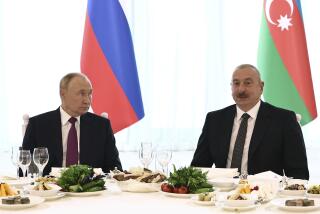Baker on Tour for Human Rights : Diplomacy: He preaches democracy and assails Iran on visits to Turkmenistan and Azerbaijan.
- Share via
ASHKHABAD, Turkmenistan — Secretary of State James A. Baker III preached democracy and human rights to Turkmenistan’s president in a colorful native yurt near the Iranian border on Wednesday after obtaining pledges of human rights reform from Azerbaijan, another of the newborn states of the former Soviet Union.
Starting a tour of four predominantly Muslim republics of the collapsed Soviet Union, Baker attacked Iran’s government for its support of international terrorism and told his hosts that they cannot expect good relations with Washington if they become too friendly with Tehran.
In a joint news conference in Baku with Azerbaijan’s President Ayaz Mutalibov, Baker recited the now familiar principles--democratic politics, free-market economics, human rights, protection of minorities and peaceful resolution of disputes--that Washington has put forward as guidelines for establishing diplomatic relations with the former Soviet republics.
“These principles are not principles that we believe are shared by the government of Iran,” Baker said.
Mutalibov seemed unimpressed. Asked if he were concerned with Iranian penetration of the former Soviet republics, the Azerbaijani president replied: “We are building an independent state. We want to maintain good relations with all countries in the region. I don’t see the reason for the question.”
Later, Baker took a 45-minute drive from Ashkhabad along the fortified border fence that separates Turkmenistan from Iran to confer with Turkmenistan President Saparmurad Niyazov at his country house. They began their talks beside a crackling fire inside the conical reed and felt yurt, traditional home of Turkmeni nomads.
On his way to Turkmenistan, Baker stopped in Azerbaijan to urge Mutalibov to seek a peaceful settlement of the bloody ethnic war in Nagorno-Karabakh, a predominantly Armenian enclave in Azerbaijan. A senior U.S. official said later that Baker suggested the Azerbaijanis lift a trade and energy embargo of Armenia as an initial “confidence-building measure.”
Baker said he told leaders on both sides that “it seems to me that the job of creating a new independent nation, bringing it into the family of nations and starting a free market is a big enough job in and of itself and it doesn’t need to be burdened by . . . a continuing dispute of Nagorno-Karabakh.”
Mutalibov replied that Azerbaijan wants to end the dispute without further bloodshed but he insists that Armenia is primarily at fault.
With Baker at his side, Mutalibov recited the U.S. principles for diplomatic relations and proclaimed: “I agree with all of them.”
Baker said he will report the results of the meeting to President Bush, apparently clearing the way for an early extension of diplomatic ties. Washington recognized rival Armenia last month. The politically potent Armenian-American community has demanded that the Administration withhold diplomatic relations until Azerbaijan lifts the blockade of Armenia and permits self-determination in Nagorno-Karabakh, which has voted to secede from Azerbaijan.
Although the State Department’s annual human rights report, issued less than two weeks ago, was sharply critical of Azerbaijan, Baker said he has “no reason to believe” that the Baku regime will renege on its promises of human rights and protection of minorities. A senior State Department official said later that the United States will just have to “wait and see” if Azerbaijan keeps its pledge.
According to the State Department human rights report, the Azerbaijan government “deported whole villages of Armenians from Nagorno-Karabakh,” censored opposition newspapers, interfered with opposition political groups and interfered with religious freedom of Christians in the enclave.
In Turkmenistan, Baker and Niyazov spent a colorful, convivial evening together, despite differences they may have over the republic’s refusal to privatize its economy. The State Department’s human rights report also accuses the Ashkhabad government of jailing political dissidents on trumped-up criminal charges; the night before Baker arrived, police placed about 20 opposition leaders under house arrest, according to diplomats here.
Baker and Niyazov had been scheduled to spend only a few minutes in the cramped yurt before joining aides for a formal dinner. But they stayed together for more than two hours, sending out for course after course of food.
They sat on cushions in front of walls richly hung with Turkmeni rugs. Baker wore a yellow robe over his business suit. Niyazov, who at first sat down in a business suit, put on a brown robe after Baker demanded: “Where’s your robe?”
More to Read
Sign up for Essential California
The most important California stories and recommendations in your inbox every morning.
You may occasionally receive promotional content from the Los Angeles Times.










